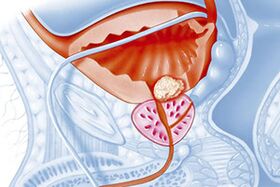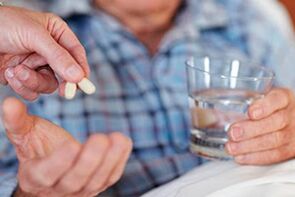Chronic prostatitis is an inflammatory disease of the prostate gland, characterized by alterations of the organic tissues and functional disorders of the prostate, the male reproductive system and the urinary tract.

The prostate is a tubular alveolar gland found only in men. This gland is involved in the production of sperm and is located under the bladder at the beginning of the urethra. Chronic prostatitis in men can occur due to an infection of the prostate gland from the bladder through the blood and lymphatic vessels of the pelvis or otherwise. Although the presence of an infection cannot cause disease or impotence, it does not usually go away for a man without a trace. At the moment, the man is observing a decrease in penis hardness, sexual dysfunction during sex and urinary disorders.
Chronic prostatitis does not threaten a man's life, but it can still cause psychological distress and deterioration of family relationships. It should also be noted that, according to experts, chronic prostatitis, i. e. its untimely treatment, can lead not only to the development of serious complications, but also to prostate cancer. In fact, in addition to infection, there are a number of other factors that predispose to chronic prostatitis. However, the manifestation and exacerbation of chronic prostatitis has different specifics.
Stages of chronic prostatitis
Although there is still no single specificity for the development of chronic prostatitis, experts distinguish the following types of it:
- I acute bacterial prostatitis;
- II prostatitis of bacterial genesis. It is most commonly found;
- III chronic non-bacterial prostatitis is a symptom complex of chronic pelvic pain, lasting more than 3 months;
- category III A is a type of inflammatory form of chronic prostatitis with an increase in the level of leukocytes in the secretion of the prostate;
- III B is a non-inflammatory form of chronic prostatitis without an increase in the level of leukocytes and pathogens in the secretion of the prostate;
- Type IV is diagnosed as asymptomatic chronic prostatitis, which does not cause pain and is detected almost by chance based on the results of the analysis of prostate secretion or its biopsy.
The frequency and causes of this category of chronic prostatitis are not yet known. As for the reasons for the development of other types of disease, it should be noted here that they may be due to the penetration of various infectious microorganisms into the ureter, as well as a violation of various functions in the human body.
Preventive methods of inflammation of the prostate
Chronic prostatitis requires long-term treatment. Therefore, it is best to follow preventive measures to avoid it. To do this, the patient will only have to make some changes to his lifestyle, which will not only be useful for the general state of health, but also relieve this disease. So, first of all, the following prevention rules must be observed:
- strive to lead a healthy lifestyle;
- completely exclude spicy foods from the diet;
- do not abuse alcohol;
- playing sports, including exercise that helps strengthen muscles and improve blood circulation in the pelvic organs;
- attend yoga classes at will;
- observe methods of prevention and treatment of infectious diseases;
- eliminate pelvic congestion and promptly treat rectal diseases;
- exclude excessive masturbation;
- try to have a regular, but at the same time safe sex life;
- avoid hypothermia;
- do not sit on cold surfaces;
- during sedentary work, warm up more often.
In addition to these preventive measures, men should take into account the fact that chronic prostatitis manifests itself insignificantly. Therefore, if a man observes discharge during urination or defecation, and even feels a slight pain, in this case it is worth immediately consult a doctor. It is also worth remembering that the course of treatment should be carried out strictly under the supervision of a specialist without any neglect. In addition, the selection of drugs during antibiotic therapy is carried out based on the individual condition of the patient and only after undergoing special studies. Taking prescribed medications should not be stopped and, even more so, additional medications should not be taken without a doctor's prescription. Do not delay your appointment with your doctor. By searching our website, you can easily find a clinic that suits both the location and pricing policy.
Causes of inflammation of the prostate
Chronic prostatitis in medicine is positioned as a polyetiological disease. In addition to the penetration of infection into the ureteral organs, it can occur and recur due to the appearance of autonomic and hemodynamic disorders, as well as a weakening of the immune system and autoimmune, hormonal or biochemical processes. Inflammation of the prostate gland can develop against the background of such diseases as:
- depression;
- neurogenic bladder dysfunction;
- reflex sympathetic dystrophy;
- inflammatory processes of localized nearby organs;
- hypertrophy of the bladder neck;
- prostate adenoma;
- stricture of the urethra;
- rectal diseases.
Given these factors, the following reasons are attributed to the risk of developing inflammation of the prostate:
- a sedentary lifestyle, especially in a sitting position, involves a dysfunction of the blood supply to the pelvic organs;
- local hypothermia of the body;
- frequent constipation;
- irregular sexual intercourse or sudden exertion;
- chronic infections;
- previous sexually transmitted diseases. In particular, their delayed treatment;
- improper nutrition;
- lack of sleep;
- chronic stress.
In addition, chronic non-bacterial prostatitis can be caused by the formation of myofascial trigger points during the course of diseases, injuries and surgery on the pelvic organs.
Chronic Prostatitis Symptoms

The symptoms of chronic prostatitis do not bother the man very much. Inflammation of the prostate occurs suddenly. The patient may be bothered by acute pain in the perineum and groin area, and may also experience pain when urinating and defecating, accompanied by discharge from the urethra. All of these signs of chronic prostatitis can be accompanied by fever, fever and fever. Most often, these symptoms are intermittent. Also, chronic prostatitis can be expressed in the form of complications of sexually transmitted diseases. During the course of the disease, the patient may experience discomfort when urinating, pain in the perineum and manifestation of discharge. Chronic inflammation of the prostate leads to erectile dysfunction and delayed ejaculation.
The inflammatory process of the prostate moves deep into the urinary system, which can lead to cystitis and pyelonephritis. Most often, these exacerbations end with inflammation of the testicles and appendages, which leads to infertility, which requires long-term treatment. Therefore, you should not postpone the visit to the doctor. Prompt diagnosis and treatment are needed. It is important to remember that chronic prostatitis can be cured if the disease is not triggered.
Chronic prostatitis diagnostics
As a rule, the doctor can diagnose this or that type of chronic prostatitis based on the complaints indicated by the patient or after examination. First, the specialist palpates the prostate gland, then advises the patient to perform a laboratory study of the urine culture reservoir and prostate secretion. This diagnosis allows you to determine the further treatment of chronic prostatitis. In addition, the urologist can apply such diagnostic methods as:
- transrectal ultrasound, which allows you to determine the size and volume of the prostate, as well as to identify the presence of neoplasms;
- determining the urethral pressure profile allows you to find out the cause of urinary disorders and the functions of the pelvic floor muscles;
- microscopic examination of the scraping of the mucous membrane of the urethra, which helps to determine the presence of a specific flora that causes infectious diseases; X-ray of the prostate;
- MRI of the pelvic organs, which helps differentiate with prostate cancer, as well as identify a non-inflammatory type of bacterial prostatitis;
- determination of the state of humoral and cellular immunity in the secretion of the prostate. This type of research helps not only to diagnose the category of the inflammatory process of the prostate gland, but also to solve the question of what method can be used to treat chronic prostatitis.
Treatment of chronic prostatitis
Chronic prostatitis is considered an insidious and complex disease, the method of its treatment requires an integrated approach. Urologists use treatments such as:
- antibiotic therapy, during which drugs are prescribed that destroy the hidden microorganisms of the infection. The patient takes these drugs for several weeks. In the absence of adequate effect, antibiotics can be replaced with another group of drugs;
- physiotherapy may include exposure to electromagnetic, ultrasonic and laser waves, which significantly increases the effectiveness of antibiotic therapy;
- magnetic laser therapy has an anti-congestive effect and improves blood microcirculation in the pelvic organs;
- transrectal prostate massage is the most painful and uncomfortable treatment method, but at the same time the most effective. It is based on the elimination of the inflammatory secretion by squeezing it with a finger;
- darsonvaluation;
- electrophoresis with drugs;
- hormone therapy;
- transurethral electrosurgery. This method of treatment can be used only in case of complications that, in addition to violations of the urination process or reproductive function in a man, led to the onset of sclerosis of the prostate and bladder neck. If, after surgery, an exacerbation of the chronic inflammatory process is observed, in this case the patient can remove all the remaining gland;
- immunocorrection aims not only to eliminate the infection, but also to completely eliminate its reappearance. This method of treatment implies the normalization of lifestyle, which involves an active lifestyle, regular walks, adherence to the daily regimen and proper nutrition;
- Spa treatment.
Also, the prescribed treatment for chronic prostatitis can include a visit to an immunologist and additional special tests. Since the interruption of this or that course of therapy does not guarantee the complete destruction of the prostatitis infection, therefore, there is a possibility that it will recur. To cure chronic prostatitis, the patient must strictly follow all the recommendations of the doctor and follow the prescribed course of treatment to the end.





































